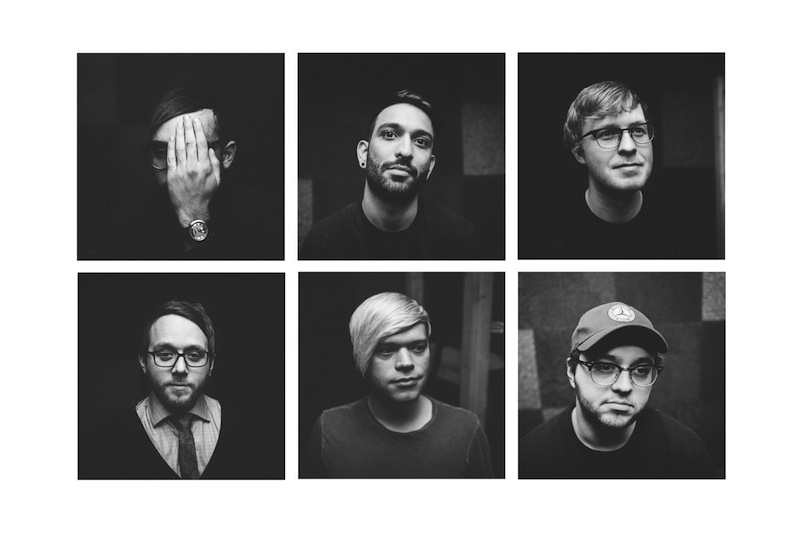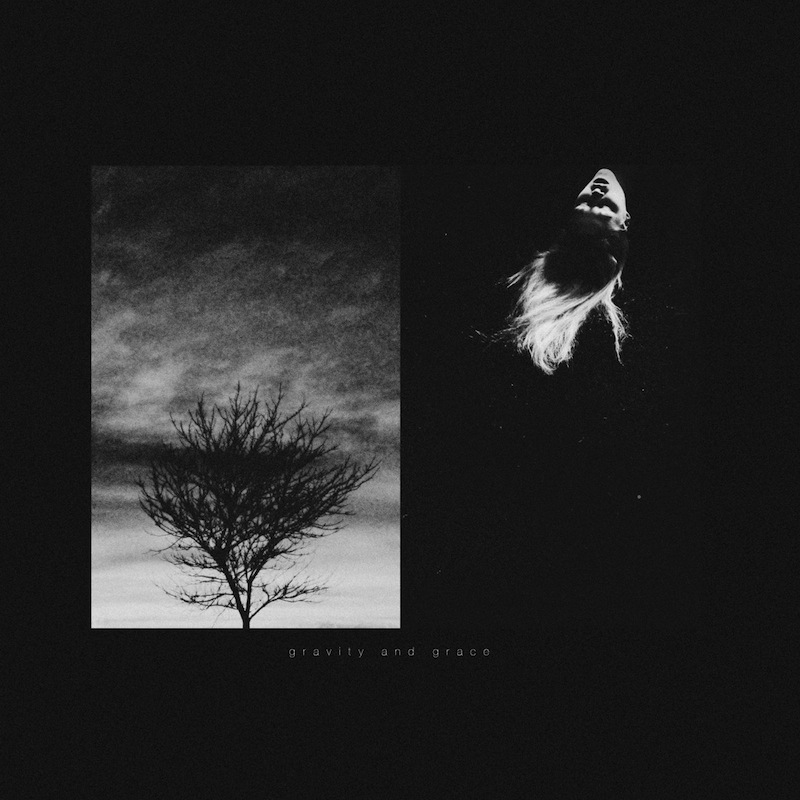Wasting Light: An interview with Respire

Music is an elemental force. No matter the implications of any artist’s intentions, for many, music represents an outpouring of emotion able to articulate a feeling that can at times feel alien. This “other” whether it manifests as depression or hopelessness, is a void that resides more or less within us all, and Toronto black metal/shoegaze/hardcore sextet Respire are conductors of a symphony between the cosmic indifference of the world, and our personal struggles that emerge from within.
Their latest work, Gravity and Grace—featured on Treble’s list of 2016 Overlooked Albums—has been a tremendous hidden gem of the past year. And overlooked it indeed was, if only for how singular a work it was. If there was ever a work that was so defiant in terms of categorization, so experimental yet familiar, one would struggle to identify it. Gravity and Grace is a staggering work that takes a certain emotional maturity to grapple with.
Respire’s Egin Kongoli and Rohan Lilauwala were kind enough to speak with us in an interview that’s just as revealing, intimate, and thoughtful as their music.
Treble: How did Gravity and Grace come into perspective as a full-length album? What was the recording process like?
Egin Kongoli: Well. That’s definitely a bit of a story. We technically started writing this album all the way back in 2013 when we began to put Respire together. A full-length was always the dream and the plan and what we worked towards. An LP feels so cohesive and singular, it always felt right as an idea for what we were trying to do. The first two songs we ever wrote (“Eternal Nothing” and “Eternal Light”) ended up on this record, so, yeah, I would say three years in the making. The actual chunk of writing happened in 2014/2015, and the real groundwork for the layout of Gravity and Grace was drawn out in the spring months of 2015.
Rohan Lilauwala: The recording process was grueling but extremely rewarding. It took us forever—six months to record and three to mix. Working with our friend Paul Mack made all the difference—he is probably even more of a perfectionist than we are and indulged the entirety of our ridiculous and over-the-top ideas.
It’s sometimes mundane to ask for clarity of explanation for lyrics on any song, but could you talk about the themes (like existentialism) and ideas that fueled the album lyrically?
EK: Hmm, yeah. I’ve always written, mostly embarrassingly, confessional and personal lyrics in previous bands before this and I think when Respire started I wanted to sort of leave that behind. Dress things up in theory and metaphor to put a distance between myself as writer and my issues as subject. I don’t know how I’ve succeeded in that, but here is a run down of where my head was at with these songs.
There is a fair amount of the idea of God thrown around in Gravity and Grace, the feeling of being abandoned. The idea of thrown-ness has always haunted me and I think as a devoutly non-religious person that’s where the whole God thing comes into play. If I’m thrown into being without choice, and left to suffer, where is the God in all of this? In “Eternal Nothing,” I quote Heidegger directly, “As soon as man comes to life he is at once old enough to die.” I think the dichotomy of the two ideas presents a pretty rough reality. I’m thrown into being and I don’t want any of this, and I’m also aware that from the moment of me being thrown that I am headed straight towards an end that is also, mostly, out of my control. So what do we do? How do we try to live authentically when authenticity seems out of our reach? I guess in my case the answer has always been with alcohol or drugs. And therein I think lies most of the thematic conflict behind this record from my perspective. Dealing with addiction and the consequences of substance abuse in the face of the purposelessness of life. Don’t know if that makes sense.
The cover art is staggeringly haunting for Gravity and Grace, how was it designed?
EK: The cover art is a piece from a very talented photographer named Amanda Elledge. I found her stuff on Tumblr and have always been a really big fan. Really gritty, dark, textural compositions. We went through a bunch of options collectively but once I put together the layout for what the cover is right now, it was obvious we had found the perfect choice. The simplicity of the two images within the context of the album title is definitely heavy. I love that you used “staggeringly haunting” to describe it. I feel the same way. It really couldn’t be a better fit.

There’s a fear among many artists that are tackling darker and more complex themes will somehow ostracize potential audiences, I can’t say that I personally feel that from Gravity and Grace at all. How do you balance inviting others to listen to your music without feeling overwhelmed?
RL: I think that Gravity and Grace does require some emotional investment to get through, but we’re hoping that the emotion that we poured into making this record permeates, and someone listening feels something in turn. Something that we aimed for from the beginning was a balancing of the anguish, contrition, and heartache with a sense of hope, forgiveness, and renewal. I hope we managed to find that balance.
EK: I think the soft spot for Respire is that we sound really pretty, even when talking about things that aren’t pretty. It was always the goal to hide our vocals in the mix and make sure that it was more of a textural addition rather than a front-and-center force. The meaning behind the words are right there if you want in the liner notes, but other than that I’ve always wanted to have a distance between the meaning and the listener. I think that distance is where I feel safest and most comfortable live and on record. I’m able to make this a cathartic act when there is that disconnect.
What types of situations and events motivate the construction of a work like Gravity and Grace?
EK: Mornings full of regret, lying awake all night, feeling incapable of loving, of being loved. Self-destructive nights, unfortunate binges, relapse. Breakups and being abandoned by those you love. Heartache. Self-doubt. Self-hate. Regret yet again. Disgust with your own reflection. Those sorts of things, y’know?
Respire is based out of Toronto, a city with a diverse music scene. Do your surroundings influence your sound and art?
RL: Toronto brought us all together from different walks of life and we all met playing music in different bands around the city. Toronto is definitely a place of contrasts—a city with tons of creative energy and enthusiasm, but also one that becomes more homogenous and sterile every day a new glass box in the sky is built. It’s a place with lots of warm, supportive and genuine people we’re proud to call friends, but can also feel oppressing, bleak, and heartless.
EK: Absolutely. I grew up out of the independent music scene in Toronto, and in Canada. One of the first bands I saw as a kid was Broken Social Scene. Seeing that many instruments and bodies up on stage was so inspiring. The use of non-traditional “rock” instruments in that setting to create dynamics and movement was a huge thing. The 2000s indie scene taught me to do things differently. That you didn’t have to just play in your genre and that music was about doing things differently, experimenting, and always keeping true to DIY.
There are so many sonic permutations and genre influences on this album. How did you construct those layers, and how much planning went into them? (if any at all).
EK: Quite a lot of planning for sure. When we write the base of our songs, we make sure to score everything out on paper to make sure there isn’t any dissonance that we don’t intend on, and that everything fits and makes sense. In recording, we use the score as a guideline to figure out what could use more. Whether it’s repeating a melody on glockenspiel or getting our good friend Stefan to play it on strings, we try to figure out what makes sense for the song and just blowing it up as much as we can. My first band in high school was a post-rock band with three guitars, a viola and violin. I’ve always tried to make things as big and pretty as possible. I think we did it right on Gravity and Grace.
RL: I have to tip our collective hat to some of our friends that collaborated on the record. It’s a great feeling to know that talented musicians are enthusiastic about getting involved in a project that we invested so much into.
Speaking of tropes, as an artist, do you recoil when critics might attach the genre terms “emo” or “screamo” to your band? If so, why?
EK: Not at all! We know who we are (laughs). We all came together in Toronto’s DIY post-hardcore/emo scene and have spent our adult lives playing in bands with each other, releasing splits with each other, all just whining and crying into a microphone about our broken hearts. I would like to think we as a band are more than just those labels, but either way, it doesn’t bother me at all. I love emo and for me, it’s a wider term to describe emotionally raw and honest music. Under that definition, hell yes we are emo. And proud of it.
RL: I think there’s a little bit of cringing that’s inherent to genres and subgenres, but also a lot of elitism that goes into bands rejecting genres they don’t want to be associated with. If people listening to our record feel something and that makes us emo, I don’t think we’re going to get too bent out of shape about genre labels.
As we discussed earlier, there’s a lot of compelling themes on this album, does it ever become emotionally and physically exhausting to grapple with these songs during live performances? Or is it cathartic and fulfilling for everyone involved?
EK: If it’s not emotionally exhausting it’s not worth it. Respire is in a lot of ways what I have to ground myself and keep myself going. I want to feel it all and I want to bring myself to that emotional limit. When we play live we start with a sample. I try to disconnect myself from the crowd and the setting and just focus on the feelings and meaning behind the songs. I’m not sure about everyone, but catharsis is the name of the game for me.
Is there a light at the end of the tunnel?
RL: There is, but we’re still not sure if it’s the end of a tunnel or an oncoming train.
EK: There’s only light behind you. The end is the end. Believing that there’s a light at the end is a waste of our mental resources. The light is a distraction. It’s a way to escape responsibility. If we focus too much on the end of the tunnel, on whether or not there is light, we will find ourselves at the end facing inescapable darkness, realizing too late that we’ve wasted the light. “Though our death may bring final calm upon this veil to shroud our eyes, life’s light lingers like a lover’s kiss untwined… After all this, we know it to be true, we are at the valley of death.”

